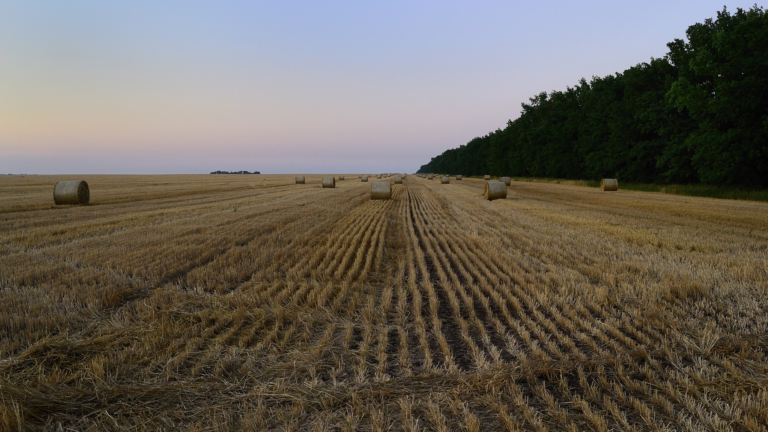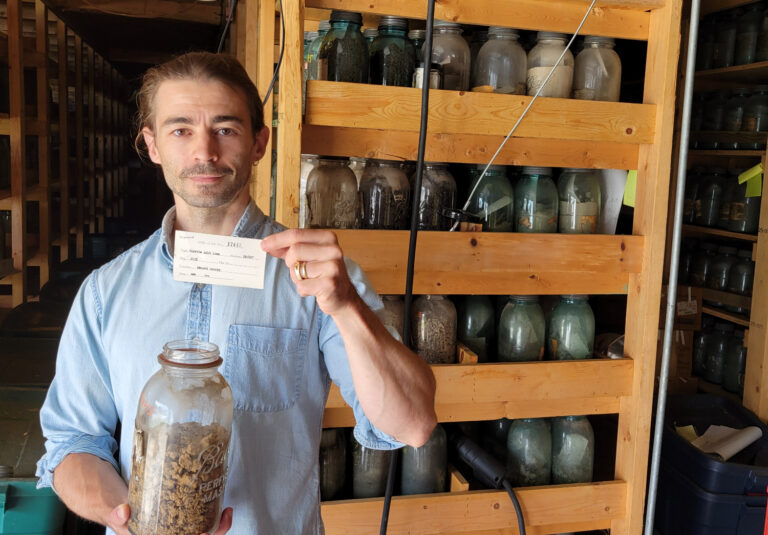URBANA – Ripple effects from the war in Ukraine will likely be felt in all corners of the globe — especially when it comes to the food supply.
The conflict is exacerbating already-existing supply chain disruptions and sky-high food prices. Not to mention, Ukraine and Russia provide nearly 30 percent of the world’s wheat and nearly 20 percent of its corn.
Megan Konar researches global supply chains at the University of Illinois. Last week, she penned an op-ed in the New York Times about a potential global food crisis.
Illinois Newsroom’s Dana Cronin spoke with Konar about the op-ed, and about what steps the United States should take in order to avoid a global food crisis.
This interview has been lightly edited for clarity.
Dana Cronin: First – very generally – can you draw the connection between war and global food security?

Megan Konar: Food security is pretty much always exacerbated in times of war. Actually, a lot of times we don’t realize that as many people died, for example, in World War II as died in actual conflict. About 20 million people died in conflict in World War II and 20 million people around the world died from hunger, starvation and famine. So war and food security are very tightly related to one another.
DC: OK, so now to the specifics of your op-ed. You touch on three main ways Russia’s attack on Ukraine is impacting the world’s food supply. Can you walk me through those, maybe starting with Ukraine and Russia’s hold on the global grain market?
MK: Yeah. Well, war and food security are usually pretty local. Usually, just the local population suffers food insecurity during conflicts. But the current situation in Ukraine is particularly troubling because war has come to a major breadbasket for the world. So now grain production shocks will ripple through the global economy. And this will likely exacerbate food security concerns in nations that are already facing food security challenges, nations that are heavily reliant on Ukrainian and Russian wheat — for example — Egypt and Turkey. Both of these countries receive over 80 percent of their wheat imports from these combatants. And they’re big bread consumers, so wheat is very important to the diet of people in these countries.
DC: And I want to touch a little bit more on supply chain disruptions contributing to food inflation. I mean, that’s something that will likely be felt everywhere, including here in the United States.
MK: That’s right. Already before the conflict in Ukraine, we were seeing the highest levels of inflation in decades, largely due to supply chain disruptions following the pandemic. Prices were already growing very quickly, so this war comes on top of already inflated food prices.
DC: Same goes for fertilizer prices, which, prior to this Russian invasion of Ukraine, were already sky-high. And we know that Russia and Belarus are big fertilizer exporters. Can you talk a bit about that?
MK: Yeah. Well, here is a good example of the interrelationship between economic sectors. Fertilizer is a very energy intensive product, so it needs a lot of energy to create fertilizer. And Russia is a major energy exporter, and its energy supplies are disrupted. That will cause those prices to go up, which will in turn feed into fertilizer prices. And Russia and Belarus are also major exporters of fertilizer themselves — which if those supplies are disrupted, yeah, fertilizer prices are likely to go up a lot. And they were already, before this conflict, very high due to additional supply chain issues.
DC: So Professor Konar, what can the international community do, especially the United States, to prevent a global food crisis?
MK: So I think there’s two things to focus on. The first is providing humanitarian food assistance to displaced people and the conflict zone itself. Also, it’s important to think about the spillover effects to the rest of the countries in the world. The United States is one of the other major grain producers and exporters in the world. So we should be taking steps now to ensure that we produce as much grain as possible to fill the likely hole in world markets. And make sure that we keep trade open so that these important grain products can reach nations that need them.
Dana is a reporter for Illinois Public Media. Follow her on Twitter @DanaHCronin







